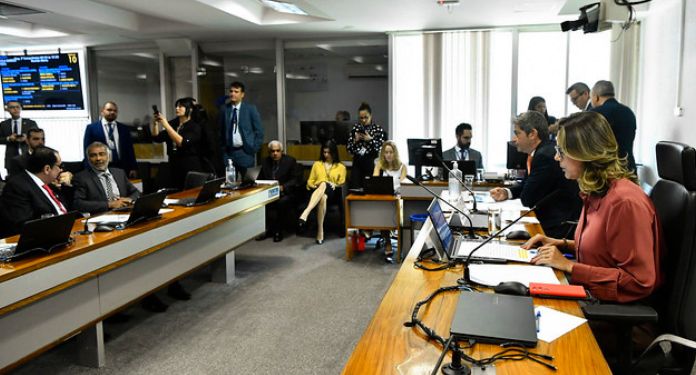A public hearing of the Senate Sports Committee (CESp) held last Wednesday (9) discussed the challenges of advertising regulation in the online betting sector. Senators and guests evaluated the new rules that came into full effect in January 2025.
The debate served as a basis for the analysis of two bills that propose greater rigor in advertising in the sector (PL 2,985/2023 and PL 3,405/2023). However, several participants considered the established deadline insufficient for an adequate analysis of the regulation.
Senator Carlos Portinho (PL-RJ), rapporteur of PL 2.985/2023, criticized the effectiveness of government measures. “We waited a year for [betting] to be regulated and effectively enforced.
Senator Carlos Portinho (PL-RJ), rapporteur of PL 2.985/2023, criticized the effectiveness of the government’s measures. “We waited a year for [betting] to be regulated and effectively applied.
Senator Leila Barros (PDT-DF), president of CEsp, led the public hearing.
Government action and regulatory challenges for betting
The Secretariat of Prizes and Bets (SPA) of the Ministry of Treasury is responsible for overseeing the sector. Since July 2024, Ordinance 1231 has established guidelines for online betting advertising. However, the full implementation of these rules will only occur in 2025.
Representing the SPA, Daniele Correa Cardoso stated that the legislation already includes several tools suggested during the meeting. “Since January, we have been concerned with monitoring and inspection.
Whether ex officio or when we receive a complaint, we carry out an analysis and the team proceeds to open an inspection process to remove the content [that violates the rules].
The challenge is precisely the speed at which this happens, considering that we are talking about a digital environment”, explained Daniela.
Furthermore, Daniele highlighted the participation of the National Advertising Self-Regulation Council (Conar) as a relevant element to stimulate self-regulation in the sector. According to her, the partnership between SPA and Conar has been “quite effective”.
Insufficient warnings and illegal betting companies
For public defender Thiago Henrique Cunha Basílio, the advertisements do not adequately address the risks involved in betting.
“We can’t have this unbridled propaganda as we have seen. We can’t think it’s enough to have a message saying ‘play responsibly’, as if that were washing our hands, transferring to the individual bettor a volitional control over whether or not to bet.
This is even more dangerous for classes D and E, which are more vulnerable to this type of spending,” said the defender.
On the other hand, Alexandre Fonseca, CEO of SuperBet Brasil, agreed with the need to improve communication about risks.
However, he pointed out another significant challenge: “We have 20,000 illegal websites operating in Brazil today, which is where gambling addicts end up finding shelter, where minors end up finding fertile ground to get involved in gambling. I think that today we have a much more serious problem, which is the fight against illegal betting.”
Meanwhile, the executive director of the Free Market Institute, Rodrigo Saraiva Marinho, argued that restrictions should not focus solely on cases of addiction.
“If we prohibit addiction, we are prohibiting people from choosing what they want to do with their own lives. A fundamental view of the idea of freedom is that people [can] make mistakes, decide what they will do and what they will not do,” Rodrigo pondered.
Reverse effect of restrictions on the betting sector
Indeed, some experts believe that excessive restrictions can backfire. Pietro Cardia Lorenzoni, legal director of the National Association of Gaming and Lotteries (ANJL), cited the Italian example.
“Brazilian consumers still do not know what is legal and illegal gambling. Advertising is a way of informing consumers which market is legal.
[In Italy] the impacts of the ban were negative. Consumers were diverted to the illicit market. This means no consumer protection, no protection for children and adolescents, and no funding for public policies,” warned Pietro.
It is important to note that Law 14,790 of 2023 determines that 12% of the revenue from betting companies must be allocated to various areas, including sports. The vice president of the Brazilian Olympic Committee (COB), Yane Marques, reported that the committee received its first resources in March.
Influencers and economic impact
Senator Styvenson Valentim (PSDB-RN), author of PL 2.985/2023, explained that his initial intention was to completely ban advertising. “[The influencer] manages to get people to consume the product he wears.
The shampoo that [football player] Cristiano Ronaldo uses, I’m using, to see if I look as handsome as him. That’s how marketing works.
[The companies] have the financial conditions and the legal possibility for this to happen, we just want to reduce the impact of the influence on those weak people who do not have the ability to not play”, he argued.
However, Senator Jorge Kajuru (PSB-GO) expressed concern about the economic impact of radical bans. “All the bosses [of the television networks] talked to me, and the conclusion is that, if advertising ends, the only broadcaster that will survive is Rede Globo.
The others will go bankrupt. We will also cause a terrible financial situation for the football teams, which no longer have another company to sponsor them,” warned Kajuru.

